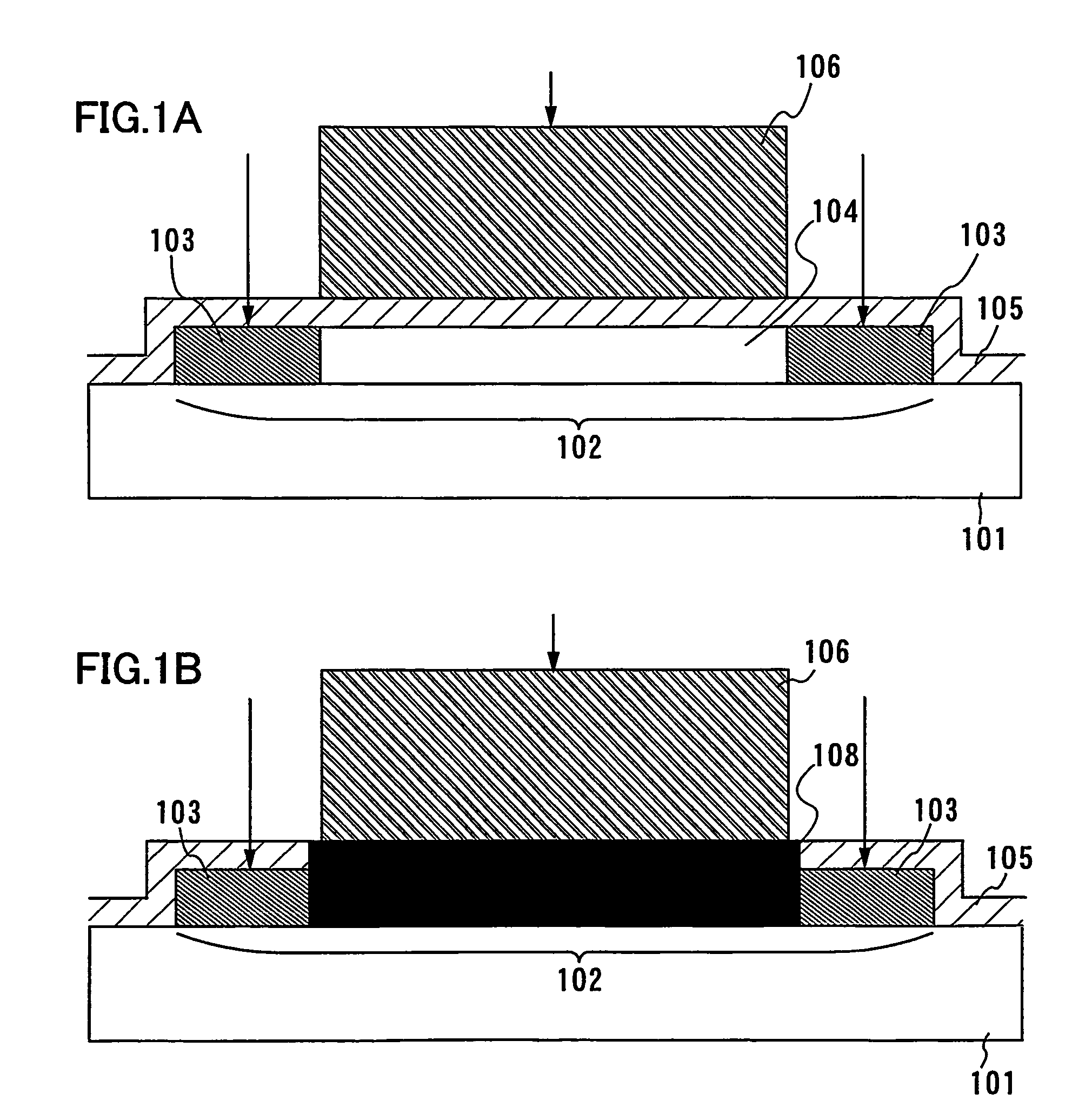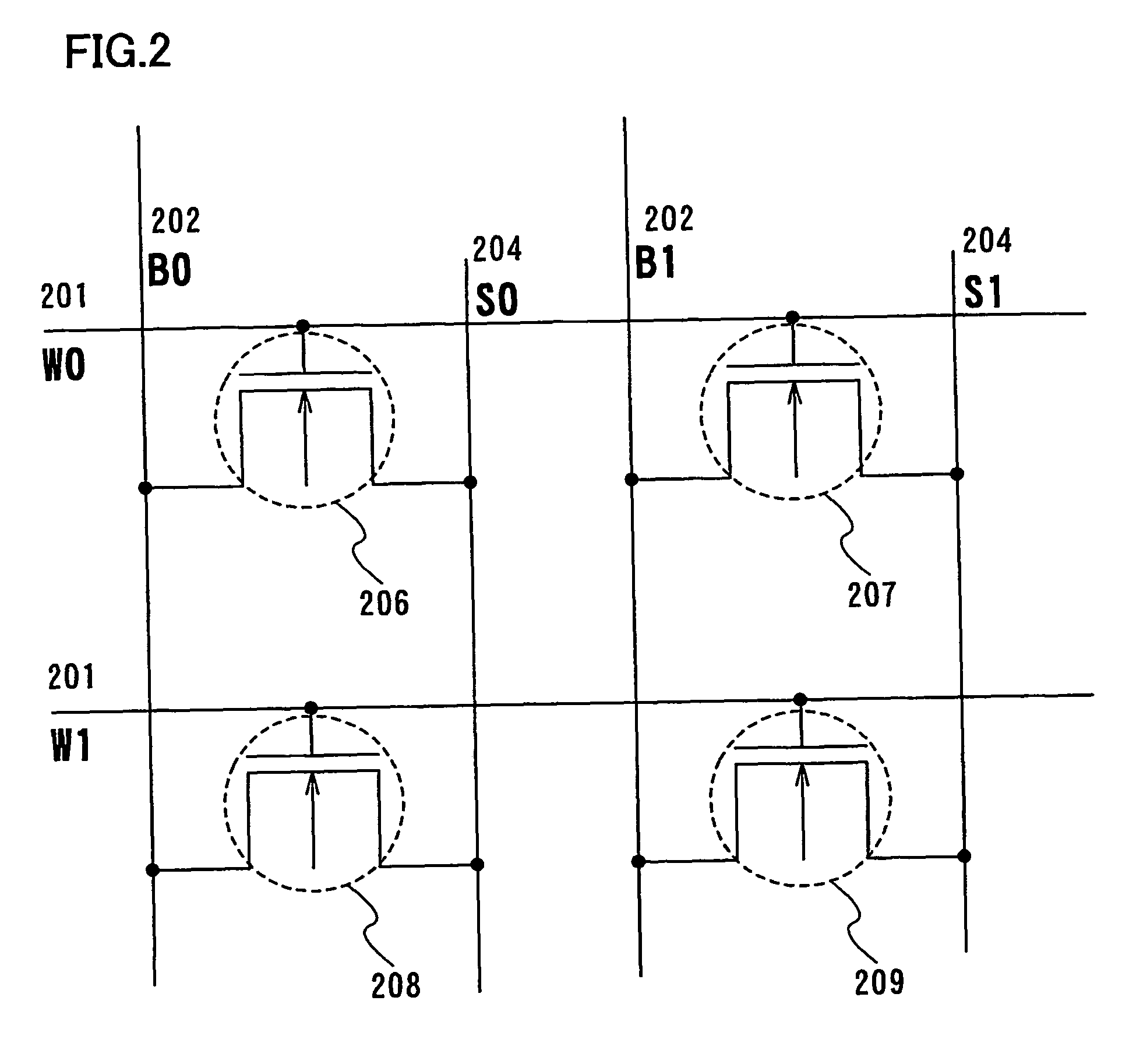Memory device and manufacturing method of the same
a technology of memory and manufacturing method, which is applied in the direction of semiconductor devices, semiconductor/solid-state device details, instruments, etc., can solve the problems of increasing the size of the completed device, increasing the cost of manufacturing two circuits that are a memory and other functional circuits, and reducing the efficiency of manufacturing, so as to reduce the cost of manufacturing, not limit the product specifications, and reduce the effect of productivity
- Summary
- Abstract
- Description
- Claims
- Application Information
AI Technical Summary
Benefits of technology
Problems solved by technology
Method used
Image
Examples
embodiment mode 1
[0036]When a voltage higher than required for normal operation of a TFT is applied between a gate electrode and at least one of two impurity regions (including a high concentration impurity region) of the TFT formed on an insulating substrate, a channel region of the TFT is insulated. This operation is shown in FIGS. 1A and 1B that are cross sectional views of a TFT before and after being applied a voltage respectively. For example, a TFT shown in FIG. 1A has a semiconductor film 102 formed over an insulating substrate 101, a gate insulating film 105 over the semiconductor film 102, and a gate electrode 106 over the gate insulating film 105. The semiconductor film 102 includes two high concentration impurity regions 103 and a channel region 104. FIG. 1B shows the TFT after being applied a voltage. In the TFT, at least the channel region 104 of the semiconductor film 102 is altered and an insulating region 108 is formed under the gate electrode 106. Then, the gate electrode 106 and t...
embodiment mode 2
[0050]In a memory device of the invention, a high concentration impurity may be added over the entire surface of a semiconductor film of TFT as a memory cell. Instead, an impurity may be added to any portion of a semiconductor film and two wirings may be connected thereto; however, when forming an impurity region arbitrarily, the element does not function as a transistor. Meanwhile, when a high concentration impurity is added over the entire surface of a semiconductor film, all the three terminals can be insulated from each other by applying a voltage between an electrode and at least one of two wirings.
[0051]Described in this embodiment mode is an example where one impurity region (high concentration impurity region in this embodiment mode) is formed over a semiconductor film on an insulating substrate and two wirings are connected to the semiconductor film with one electrode interposed therebetween. FIGS. 3A and 3C are top plan views of an element having such a structure. FIGS. 3B...
embodiment
Embodiment 1
[0061]In this embodiment, a manufacturing method of a TFT on a glass substrate is specifically described with reference to FIGS. 5A to 5E, FIGS. 6A to 6D and FIGS. 7A and 7B. Description is made with reference to cross sectional views of an N-channel TFT and a P-channel TFT.
[0062]First, a peeling layer 501 is formed over a substrate 500 (FIG. 5A). In this embodiment, an a-Si film (amorphous silicon film) with a thickness of 50 nm is formed over a glass substrate (e.g., a 1737 substrate, product of Corning Incorporated) by low pressure CVD. As for the substrate 500, a quartz substrate, a substrate made of an insulating material such as alumina, a silicon wafer substrate, a plastic substrate having enough heat resistance to the treatment temperature in the subsequent step, and the like may be employed as well as the glass substrate. The peeling layer 501 is preferably formed of a film mainly containing silicon such as polycrystalline silicon, single crystalline silicon and...
PUM
 Login to View More
Login to View More Abstract
Description
Claims
Application Information
 Login to View More
Login to View More - R&D
- Intellectual Property
- Life Sciences
- Materials
- Tech Scout
- Unparalleled Data Quality
- Higher Quality Content
- 60% Fewer Hallucinations
Browse by: Latest US Patents, China's latest patents, Technical Efficacy Thesaurus, Application Domain, Technology Topic, Popular Technical Reports.
© 2025 PatSnap. All rights reserved.Legal|Privacy policy|Modern Slavery Act Transparency Statement|Sitemap|About US| Contact US: help@patsnap.com



